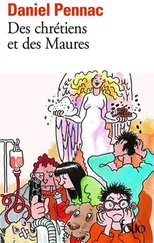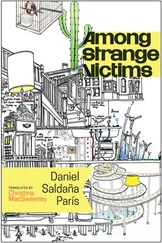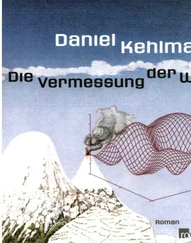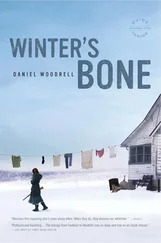Marie put her arm around Matthias’s neck. She felt him flinch; he found it awkward whenever she touched him in front of her father. He was afraid of him, you couldn’t reproach him for that.
It wasn’t easy having a boyfriend. Sometimes she wished she’d waited, but Lena already had one, Natalie had one, and even Georg would have liked to have a girlfriend. In desperation he’d even asked Marie, but she’d had to laugh, the thing was too absurd. She’d been together with Matthias, who was already sixteen, a year older than she was, for a month now, and she’d already slept with him three times. The first time it was strange and a bit exhausting, and the second time it just seemed really dumb, but the third time, at his house, while his parents were away and the dog kept scratching pathetically at the door, suddenly made her understand why people made such a fuss about it all.
The acolyte stepped back. Martin was now in his full vestments. Immediately he looked thinner and radiated worthiness.
“Is Laura coming too?” asked Eric.
“She’s shooting,” said Marie. “They’ve enlarged her role in the new season.”
“So what’s it like, this series?” asked Martin.
“Very good,” said Matthias. “Really interesting.” Marie poked him with her elbow. Both of them had to grin.
It was a year ago when she’d begun to draw. Nobody knew, she was still too inept in the way she laid down her lines, the shapes of things were not yet under her control, but she had no doubt that she would get better. Later she intended to study graphic arts alongside her major, which would be medicine, and then she’d pick up another language, or maybe three or even four, but not more: she still wanted to be able to read books and take trips to distant continents, Patagonia was a mustsee, as was the coast of North Africa, and she also had to get to China.
“So, let’s do this.” Martin opened the door. Outside the snow was coming down in big, slow-falling flakes.
It was only a few steps to the church. Martin went first, followed by Ron, then Eric, with Matthias and Marie bringing up the rear. She stuck out her tongue to taste the snow. The white cold stifled all noises. She tucked her arm into Matthias’s.
“Can we go to my place afterward?” he whispered in her ear.
Maybe that was a good idea. His parents were off on another trip. They would have the house all to themselves, and yet she wasn’t sure. She liked Matthias and didn’t want to hurt him, but maybe what she needed was a different boyfriend. She tipped her head to one side so that her hair brushed his cheek. “Maybe.”
Eric looked back at them uneasily. Marie was too young to be running around arm in arm with a boy, let alone a pathetic one. It was far too early. If things kept on going like this, they would soon be kissing each other. How was he going to stop it?
He had to pray more often. Praying always helped. If he’d prayed more in the past, he’d never have gotten himself into such difficulties. All of his hunches had proved true: people were under constant surveillance, the cosmos was a system of signs arranged so as to be legible, nights were infested with demons, and evil lurked in every corner. But he who entrusted himself to God had nothing to fear. It was all plain and simple, and he couldn’t understand why his brother got so cross every time he talked about it. He’d always understood Ivan, but things with Fatso were eternally complicated. It was simpler to talk things over with his new friend Adrian Schlueter, who’d explained to him that God was obliged to forgive anyone who went to Confession: the Lord Himself was bound by His own Sacrament.
So Eric went every day to Confession. He had already been in every church in the city, he knew where you got stuck in line and where you were next up right away, where the priests were approachable, where they were inquisitive, and where even after the tenth time they didn’t recognize you; he knew which churches were better to avoid because there were demons staring down off their façades, hissing swear words and trying to prevent you from getting in. Confessing every day demanded its own discipline. Sometimes you’d done nothing wrong and you had to invent it, but it was worth the effort: you could go through life devoid of sin, as weightless as a newborn, without any fear of the Last Judgment.
He looked up. Flakes of snow were dancing against the gray of the sky. It had started to snow the previous evening, and lying on his lumpy sofa he had been unable to sleep because of the sheer silence. He had spent the night visualizing his desk, his business cards, his phone setup, his computer, his company car — everything that would be his again soon.
It was only two months since he’d bumped into Lothar Remling. Much boxing on the shoulders, loud cries, football talk: Unbelievable, whooped Eric, apropos of absolutely nothing, the game! Remling replied that you couldn’t believe how the idiots had frittered the whole thing away, and then he started talking about how these were high times for Remling. Consult, governments had been pumping so much money into the system that nobody knew what to do with it all, could you have imagined such a thing even a year ago! Then he asked how things were going for Eric, and Eric was about to answer that he was up to his ears in new projects and working himself into exhaustion, but then suddenly, to his own astonishment, he said he wasn’t doing anything.
Nothing?
Absolutely nothing. Totally, absolutely nothing. All day. He had withdrawn from the world and was living in the presbytery. With his brother. The priest.
Totally crazy, said Remling. Are you for real?
Eric said he’d realized things couldn’t go on like this. Everyone needed to declare time out once in a while. Sit and think. As for him, he dipped into the Bhagavad Gita. Meditated. Went to Confession. Spent time with his daughter. Was also administering the art collection of his dead brother. Of course he’d be making a comeback, but there was no hurry. It was so terribly easy to lose sight of the essential.
The essential, said Remling. Yes, exactly, that was what it was all about.
Then he had asked for Eric’s number, and Eric had told him he didn’t have a cell phone anymore, but he could be reached at the presbytery.
And Remling had actually called three days later, and they’d met to eat, and two days later they’d met again, and then again that same week, and everything was in the bag. No, Eric had said, he didn’t need a lawyer to take care of the contract, his future was cradled in the hands of God, and Remling had exclaimed that all this was so cool.
Eric had no doubt whatever that he was on the fast track to glory at Remling. Consult. As regards experience, he had it nailed, he knew every trick in the book, he had built one of the biggest asset-planning companies in the country. The fact that it had been torpedoed wasn’t his fault, no one had foreseen the crisis, no one had been able to know what was bearing down on them, everyone who worked for him had said the exact same thing. He met twice a week with Maria Gudschmid and Felsner for tea, and they went around in a circle saying Who Could Possibly Have Known?! Which was why the investors had accepted their losses, and why Kluessen’s son had decided not to sue. The only fly in the ointment was his onetime chauffeur, who’d written a letter to the state prosecutors, but the accusations it contained were so off the wall that nobody had wanted to pursue the thing. The sale of the almost one hundred paintings and almost one thousand sketches that had been found partly in Eulenboeck’s studio and partly in Ivan’s apartment, when combined with reproductions of Eulenboeck’s farmhouses on pens, children’s crayons, pajamas, and cups, had become so profitable that he could pay off the interest on the bridging loan. But such a shame that so many pictures had gone missing: there were three dozen paintings described exactly in Ivan’s records — nobody had ever seen them, nobody knew a thing about them, it was just as if they’d never existed. Now the boom was unfortunately a bust, Eulenboeck’s prices were shrinking, and the license agreements were all eroding, but the worst was past. He wasn’t going to jail. God had decided that one. And his instincts had sharpened themselves, and he was thinking faster than he ever had — it had been genuinely helpful that he’d had to restrict his budget for medications — he now took only the essentials, those things that made it possible to stand more or less upright and get through the day.
Читать дальше











